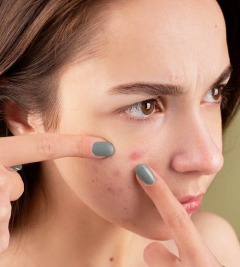
What is Acne Treatment?
Acne vulgaris is a chronic skin disease involving the oil glands at the base of hair follicles. It can lead to the formation of blackheads, whiteheads, nodules, bumps, and pus-filled lesions on the face, neck, chest, back, and upper arms. Acne starts during adolescence, though it can affect any age group. Adult-onset acne is prevalent in women with underlying hormonal disturbances. Acne impacts a patient's quality of life, affecting self-esteem and psychosocial development. Patients have to take over-the-counter and sometimes prescription-based acne treatments, and choosing the most effective therapy can be confusing.
Diagnosis and Treatment for Acne
The diagnosis of acne vulgaris is primarily clinical. History and physical examination can help determine if there is an underlying cause of the Acne. Like An exacerbating medication or endocrinologic abnormality causing hyperandrogenism (e.g., polycystic ovarian syndrome). And should be specially investigated in older women and women with menstrual irregularities. Other dermatologic manifestations of androgen excess include seborrhea, hirsutism, and androgenetic alopecia.
Treatment for acne vulgaris should aim to reduce the severity and recurrences of skin lesions and improve appearance. The approach depends on the severity of the Acne, the treatment preferences, the patient's age, and adherence and response to previous therapy. Your dermatologist can help formulate a treatment plan that's best suited for you.
The Best Acne Treatment At-home care
There are a few self-care activities you can try at home to prevent pimples and clear up your Acne -
- Cleaning your skin daily with mild soap to remove excess oil and dirt
- Shampooing your hair regularly and keeping it out of your face
- Using water-based makeup or labelled non -comedogenic (non-pore-clogging)
- Not squeezing or picking pimples, which spreads bacteria and excess oil
- Not wearing hats or tight headbands
- Not touching your face
Topical medications for Acne Treatment
- Benzoyl peroxide is an antimicrobial that kills the bacteria that cause Acne. It is also helpful in removing dead skin cells and excess oils, which can cause blockage in the pores.
- Clindamycin: It's another antimicrobial used in the treatment.
- Niacinamide: It is an anti-inflammatory agent that also increases skin hydration.
- Salicylic acid- The target of this ingredient is also to prevent the pores from becoming plugged.
- Topical retinoids- Like tretinoin and adapalene are present in many acne medications. And are often used as the first line in combination with antimicrobials.
Mild side effects with topical medications include stinging, dryness, burning sensations with redness.
Oral medications for Acne Treatment
Antibiotics
When topical agents are insufficient or not tolerated in moderate to severe Acne cases, systemic antibiotics are often considered the following line of treatment. These include tetracycline, doxycycline, minocycline, azithromycin, etc.
Isotretinoin
Isotretinoin affects all causative mechanisms of Acne — it changes abnormal follicular keratinization, decreases sebum production by 70%, decreases P. acnes colonization, and is anti-inflammatory. Isotretinoin therapy must be monitored carefully. Its adverse effects include potent teratogenicity, hypertriglyceridemia, and hepatoxicity.
Hormonal therapies
Hormonal agents provide effective second-line treatment in women with Acne regardless of underlying hormonal abnormalities—antiandrogen therapy like oral contraceptives, spironolactone, etc.
What is the best treatment for acne scars?
A combination of the mentioned approaches can help you with acne scars depending on your skin type:
- Laser resurfacing- It is the most popular technique to treat acne scars. People with darker skin types might experience some side effects.
- Chemical peel- The procedure involves applying a chemical-based solution to the scar tissue to remove the top layer of skin. And minimize the appearance of deeper scars. This process is done on a repetition basis to observe the effects.
- Surgery- Involves Cutting out the acne scars and repairing the wound with stitches or a skin graft. This procedure is also known as punch excision.
- Botox/fillers for acne scars- Injecting Botox relaxes the surrounding skin. It can help with skin texture and appearance. Fillers can give an uplifting effect, thereby reducing the appearance of scars.
- Dermabrasion/micro-needling- This procedure involves using a rapidly rotating brush to remove the top layer of skin, and the surface scars are entirely removed. Changes in skin colour and scarring are the possible side effects.
- Steroid shot for Acne- Injecting steroids into scars can help with the appearance of your skin.
Your doctors may suggest many more procedures based on your scars situation.
How to prevent Acne?
You can take steps at home to help prevent Acne after treatment. These steps include:
- Washing your face twice a day with an oil-free cleanser
- Using an over-the-counter acne cream to remove excess oil
- Avoiding makeup that contains oil
- Removing makeup and cleansing your skin correctly before bed
- Showering after exercising
- Avoiding tight-fitting clothing
- Wating a healthy diet with minimal refined sugars
- Reducing stress
Speak with your doctor to learn more about strategies to manage your Acne.